No Talks Set with One Week Before U.S. East/Gulf Coast Dock Strike

The deadlock continues between the International Longshoremen’s Association and the U.S. Maritime Alliance as the first coastwide dock strike since 1977 appears likely and ports, shippers, and carriers make a last-minute scramble. Terminal operators represented by the USMX continue to make overtures while union leaders released a statement saying “We are about to engage in one of the toughest battles our union has faced in decades.”
Negotiations for the master contract that would cover all the ports have been stalled since the anticipated start in June. The ILA initially cited disputes at the local level. While both sides filed notices with the Federal Mediation & Conciliation Service, the USMX notes that mediation could only proceed if both sides agree.
“This is no indication that the ILA is interested in negotiating at this time,” USMX said in a statement on Monday, September 23, just seven days before the September 30 contract expiration. “Our goal remains the same – we want to bargain and avoid a strike, but time is running out if the ILA is unwilling to return to the table.”
Dennis Daggett, president of the ILA released a statement on Friday, September 20, saying the union “will be on the right side of history.” He cites dockworkers’ role in keeping the supply chains moving during the pandemic while saying they want a “fair and just contract.” The new message says they “deserve fair compensation,” rumored to be a 70 percent increase over six years. He also emphatically states “We will not accept automation replacing,” jobs. He also added a reference to ending members being “benched” for sixty or ninety days “over minor infractions,” as another change in the new contract.
USMX says it has received “outreach” from the Department of Labor as well as the mediation council and other federal agencies and that it is keeping them updated. Last week, Reuters however reported the Biden administration was not intervening to impose a cooling-off period, but last year Acting Labor Secretary Julie Su was acknowledged as having played a critical role in resolving the West Coast dockworkers contract.
“A potential ILA strike will have impacts on supply chains, leading to delays in cargo movement, increased costs, and logistical challenges for businesses relying on U.S. East Coast and Gulf ports. Longer strike durations may exacerbate disruptions, affecting import and export activities, container availability, and overall operational efficiency,” Maersk warned customers in an advisory dated September 21.
Maersk reported it was still accepting export booking while encouraging shippers to expedite movements. They noted that ports are offering extended gate hours recommending that importers retrieve cargo promptly.
There have been some reports that freight forwarders are already experiencing interruptions for inland shipments as some carriers and ports begin to take steps toward an orderly shutdown. Maersk said it is “expediting earlier bookings and prioritizing import container movements,” while warning that terminals will not be able to monitor reefer boxes once the strike begins.
Maersk says it expects to anchor vessels temporarily with a daily review of the situation to determine port calls and adjustments. Its teams are “exploring alternative cargo acceptance/routing for extended strikes.”

that matters most
Get the latest maritime news delivered to your inbox daily.
USMX reported that it remains unable to schedule a meeting to continue negotiations on a master contract. Unless the Biden administration invokes a cooling-off period, the ILA has said there will be no extension and it has been planning for a year for a strike that begins on October 1 from Maine to Gulf of Mexico. It will impact roughly half of the containers and a large portion of the Ro-Ro volume in the United States.
